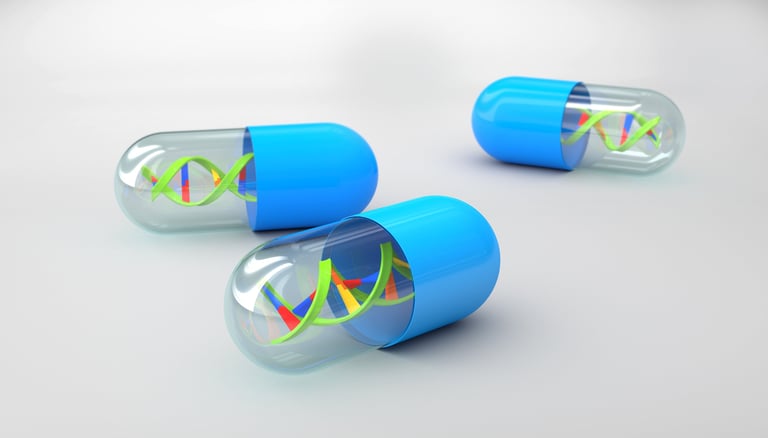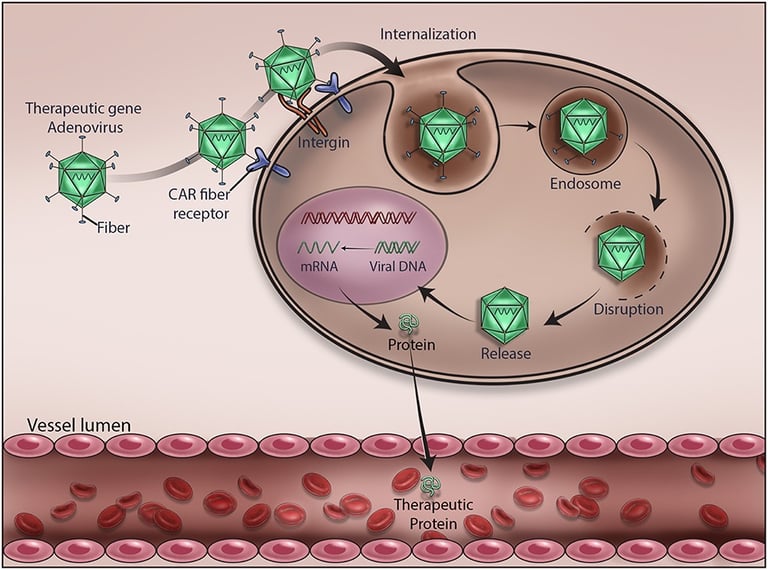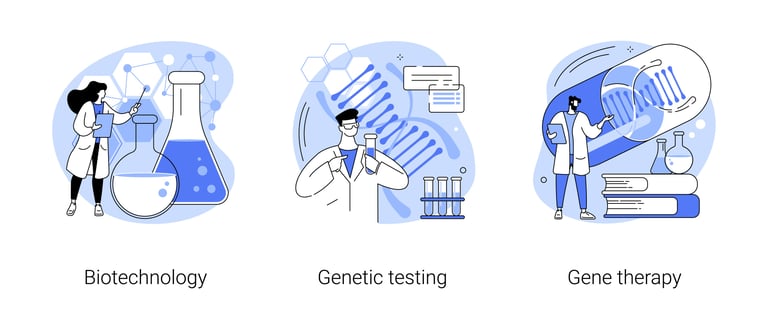Gene Therapies in Cancer
21.03.2025
GENE TREATMENTS IN CANCER


Gene therapy is a medical treatment method that aims to treat genetic disorders or diseases by replacing or repairing the genes that cause them. In this method, a healthy gene is replaced by the diseased or missing gene, allowing the cells to perform their normal functions. Genetic material is usually transferred to target cells using carriers such as viral vectors. Gene therapy is seen as a promising method, especially in the treatment of hereditary diseases, and studies are being carried out on its use in the treatment of cancer and some chronic diseases.
HOW TO DO?
Gene therapy is the process of changing genes or inserting new genes into cells to treat genetic diseases. This process consists of a number of stages and is quite complex.
Basic steps of gene therapy:
1-Goal Setting: The gene or genes that cause the disease are determined. The type of cells to be treated (e.g. blood cells, liver cells) is selected.
2-Preparation of Genetic Material: A molecule (for example, RNA molecule) is produced to correct the DNA of a healthy gene or cell. This material is designed to correct the diseased gene or replace the missing genetic function.
3-Vector Selection and Preparation: The vector that will carry the genetic material to the target cells is selected (mostly viruses). The disease-causing properties of the virus are removed and modified to carry genetic material.
4-Loading the Genetic Material into the Vector: The prepared genetic material is integrated into the vector. This stage ensures that the genetic material reaches the cells effectively.
5-Application to Target Cells: The modified vector is injected into the patient's cells or delivered to the cells by other methods. This process can be done directly within the body (in vivo) or on cells in the laboratory (ex vivo).
6-Integration of Genetic Material into Cells: The vector carries the genetic material into the nucleus of target cells. The healthy gene is integrated into the cell's DNA or functions independently within the cell.
7-Monitoring Efficiency and Safety: The effectiveness of the treatment is monitored by checking whether the genetic changes provide the targeted effects. Possible side effects, safety risks and long-term effects are observed.
8-Clinical Trials and Regulations: Gene therapy methods undergo extensive clinical trials before being used in humans. Applications are made in accordance with ethical and legal regulations.
Gene therapy is a revolutionary approach, especially in the treatment of genetic diseases, but it is still an emerging field and poses many challenges and ethical questions.
Image 1: In gene therapy for cancer, carrier viruses are generally used in the process of transferring corrected genetic material to cell DNA.


GENE THERAPIES APPLIED IN CANCER TREATMENT
Gene therapy methods used in cancer treatment are an important area of development in cancer research and include various strategies. These methods include adapting gene therapy to improve treatment outcomes for cancer patients. Cancer gene therapy has been converted into clinical trials, and more than two-thirds of all gene therapy trials conducted worldwide target different therapeutic strategies for the treatment of cancer disease. The knowledge accumulated over decades in this field has led to significant improvements in vector design, transgene repertoire, more targeted interventions, the use of new gene therapeutic technologies such as CRISPR/Cas and Sleeping Beauty vectors, and the development of effective cancer immunogen treatments.
Some specific methods used in cancer gene therapy are:
Suicide Gene Therapy: A gene (suicide gene) that can kill these cells is inserted into cancer cells. These genes are activated by a drug specific to cancer cells, leading to the death of the cells.
Tumor Suppressor Gene Activation: Enables the activation or repair of tumor suppressor genes (tumor suppressor genes). Restoring the normal function of these genes may inhibit the growth of cancer cells.
CRISPR/Cas9 Based Therapy: CRISPR/Cas9 is a gene editing technology that can correct cancer-causing genetic mutations. This technology can enable cancer cells to be treated by changing their genetic structure.
These treatments have the potential to revolutionize cancer treatment but are still in the clinical trials and research phase. Each treatment method can be customized based on the patient's cancer type and genetic makeup and can have a variety of side effects.
Image 2: Gene therapies in cancer treatment are still a developing field. He has not yet entered into routine treatment practice.


WHICH CANCERS ARE STUDIES AVAILABLE?
Research on gene therapy covers various types of cancer. These studies attempt to explore the potential of gene therapy by following advances in cancer biology and treatment. In particular, cancer types such as anaplastic thyroid cancer, breast cancer, glioblastoma, retinoblastoma, tuberous sclerosis complex, nasopharyngeal carcinoma, primary myelofibrosis, ovarian cancer and multiple myeloma have an important place in gene therapy research. The role of genetic changes and cellular mechanisms in these types of cancer is being studied intensively, and various gene therapy methods are being developed. However, more research and clinical trials are needed to translate these treatments into clinical applications.
Resources:
